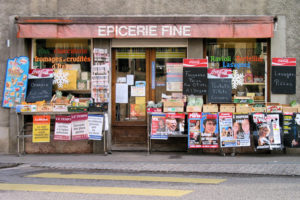My attention has been drawn to the fact that you are currently searching for bold new projects to help you quickly rebuild your church that burned down last month. As you have not contacted me directly, I thought I’d pitch you my ideas as I’m sure that you’re a fan of Swiss newspaper blogs and like to keep your English snappy (unlike our unfortunate Swiss president.)
Notre Dame de Paris is an old-time favourite in our family. My sister once stayed in a little fire-trap hotel that looked directly onto it and got some fantastic photos. And here in Geneva, of course, our very own St. Peter’s Cathedral is also filled with bells and timbers and also has a 19th-century Gothic spire. We feel a very special connection.
 My personal qualifications as advisor in this matter include the following: I have suffered shocking architectural calamity; I grew up in churches; and I happen to know a lot about roofs.
My personal qualifications as advisor in this matter include the following: I have suffered shocking architectural calamity; I grew up in churches; and I happen to know a lot about roofs.
About the initial shock, try to stay calm and get the very best local workers lined up. In our case, we immediately called Frank and Patrice when the log pierced our house in the Haute Savoie. (You might have heard about it, it became quite a cause célèbre in the Vallée du Giffre.)
Anyway, the mess stayed in situ for many months as the insurance companies had to figure out who was to blame. I certainly hope you had insurance for your cathedral, as did the person who inadvertently started the fire (in our case it was the loggers who had piled unsecured logs up the mountainside.) Mostly, insurance companies do not want to pay anything and try to claim that the accident was an act of God. In your case they might have a point.
About church knowledge, as a preacher’s kid in Canada, my Sundays were spent listening to Bible stories. So the proposition of a new spire being a carbon fibre and gold leaf permanent flame symbol is a really bad one. The most exciting Biblical flames are the horrifying, tormenting eternal flames of Hell. And they are really quite depressing when compared to the glorious and positive power of the sun.
Which brings me to my roof-knowledge which has been born out of our long political battle to get solar panels on our roof here in the Geneva countryside. We have finally won, but the Department of Monuments people can be a real pain in the butt. You will probably have lots of hassle with them too, but in my opinion, solar panels would really be the way to go.
Of course, they won’t let you have the normal, ordinary, ugly, Chinese, shiny-black ones, but you could try to get the new, classic, orange-clay coloured, French-made ones. They are bit less efficient, but much more beautiful. Just think, yours could be the first cathedral that is helping to save our planet. I think the idea is a real winner.
